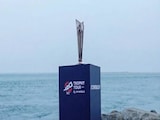- Scientists discovered 30 new deep-sea species in a remote ocean region during 2025 expeditions
- A carnivorous death-ball sponge with tiny hooks traps prey, unlike typical filter-feeding sponges
- Zombie worms observed rely on bacteria to digest fats in bones and are not new to science
A group of scientists have discovered 30 previously unknown deep-sea species in one of the most remote parts of the planet - the depths of the Southern Ocean, including volcanic calderas, the South Sandwich trench and seafloor habitats around Montagu and Saunders islands. Among these species is a carnivorous "death-ball" sponge that has left scientists and marine enthusiasts fascinated.
Scientists from The Nippon Foundation-Nekton Ocean Census and collaborators made the discoveries during two 2025 research cruises with the Schmidt Ocean Institute.
Also Read | Australian Woman Dies After Cruise Ship Leaves Her Behind On Remote Island
Details about the "death-ball" sponge?
In a press release, the scientists noted that the "death-ball" sponge's spherical form is covered in tiny hooks that trap prey, a clear contrast to the gentle, passive, filter-feeding undertaken by most sponges.
This unique feature sets it apart from most sponges, which are gentle, passive filter-feeders. The discovery of this sponge highlights the incredible diversity of life in the deep sea.
They added that 'Zombie worms' (Osedax sp.) were also observed. Not thought to be new to science, these worms have no mouth or gut. They basically rely on symbiotic bacteria to break down fats inside the bones of whales and other large vertebrates," the presser mentioned.
Also Read | Virus-Carrying Monkeys Escape In Mississippi, Public Told To Stay Away
"The Southern Ocean remains profoundly under-sampled. To date, we have only assessed under 30% of the samples collected from this expedition, so confirming 30 new species already shows how much biodiversity is still undocumented," said Dr Michelle Taylor, Head of Science at The Nippon Foundation-Nekton Ocean Census.
"By coupling expeditions with species discovery workshops, we compress what often takes more than a decade into a faster pathway while maintaining scientific rigour by having world experts involved."
Details about the expedition
In search of new species in the South Sandwich Islands, an Ocean Census Flagship expedition onboard Schmidt Ocean Institute's recreational vehicle surveyed volcanic calderas, the South Sandwich Trench and seafloor habitats around Montagu and Saunders Islands.
The findings were verified at the Southern Ocean Species Discovery Workshop hosted by Universidad de Magallanes in Punta Arenas, Chile.
The team collected nearly 2,000 specimens across 14 animal groups (phyla), alongside thousands of high-definition images and hours of video. Highlights include new hydrothermal vents at around 700 m with chemosynthetic communities, vibrant coral gardens, evidence of explosive undersea volcanism, and the first confirmed footage of a juvenile colossal squid.















